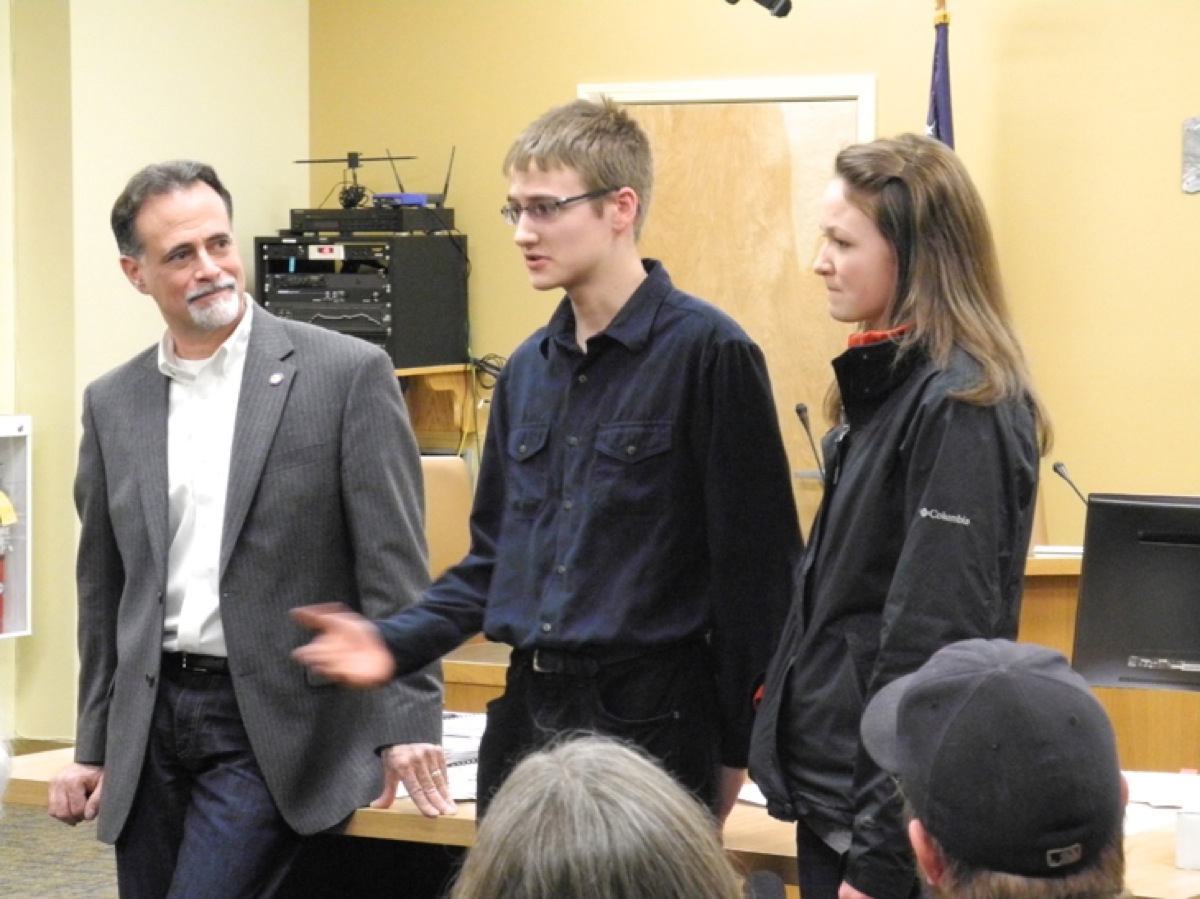In a town hall meeting last Friday that was part Q & A and part roundtable discussion, District O Sen. Peter Micciche, R-Soldotna, gave Homer a look and a listen to its freshman senator after he’d been battle tested halfway through the legislative session.
A standing room only crowd of about 75 came last Friday for pizza, treats and talk at Homer City Hall. Fishermen, college professors, nurses and retirees asked Micciche his position on everything from defining medically necessary abortions to gun control. Micciche also gave an overview of important bills working their way through the House and Senate and his opinions on them. Among them are:
• Sustainable state spending and the capital and operating budgets, Senate Bill 42: “I think we need more leeway between what we’re earning and what we’re spending,” he said. “We’ve got some tough choices to make most likely.”
• SB 21, changing the oil and gas tax structure: “I think we have enough votes to do something stupid. My job is to make sure we don’t,” he said. “If it’s fair and protects Alaskans, I’m likely to be for it. If it goes the governor’s way, I probably won’t.”
• SB 49, defining medically necessary abortions that can receive state funding: “I’m pro life, but I also don’t believe in laws that will harass someone,” he said. “It’s a very emotional issue for everyone, but this is not a black-and-white, you can have abortions freely or you cannot.”
• House Bill 69, on restricting enforcement of federal gun laws in Alaska: “We’ve got a bill relating to gun rights that may have gone a little too far,” Micciche said.
• HB 131, on derelict vessels: “Municipalities don’t have the responsibility to bear the brunt of vessels that wind up in their jurisdiction,” he said.
Micciche said he’d learned one lesson from his first 45 days.
“Whoever runs against me and wins next time, I have some advice for you. The first advice is, ‘Don’t be on eight committees,'” Micciche said.
Although Micciche ran as a Republican who said he would not join a bipartisan coalition — he didn’t — Micciche said he’s open to working with Democrats on issues, citing support for a resolution urging the opening of the Arctic National Wildlife Refuge coastal plain to oil and gas development.
“It was a bipartisan support base,” he said, adding, “I’m not sure my willingness to work across the aisle is contagious.”
Micciche said he doesn’t like seeing the chasm between political parties in Washington, D.C.
“For those in D.C. holding out while the country burns, I’ve got a problem with that,” he said. “My job is to get along.”
He also said he didn’t like some things about the majority-minority system, such as not advancing bills just because they come from Democrats.
“There have been a lot of good bills that came out of the minority,” he said.
Veteran legislators sometimes get vindictive, exacting retribution against someone for a vote in the 1980s, he said he’d discovered.
“If I get like that, you guys need to drag me home,” Micciche said.
Some of the most spirited discussion came during the question-and-answer period at the end of Micciche’s opening talk. When he got into a debate with fisherman Brad Faulkner over oil tax policy, Micciche cut him short, saying, “We’re not in our living room. It’s not a discussion.”
In a question about a bill defining medically necessary abortions, Kate Finn, a Homer nurse, said she disagreed with the bill.
“That is totally wrong,” she said. “It’s legislated misogyny.”
Micciche said the bill more clearly defines what is and is not an elective procedure, and under what conditions state funds can be used for abortions.
On a question about HB 69, the gun rights bill, Candy Rohrer said she felt uncomfortable about language that said federal agents enforcing federal gun laws could be prosecuted by state officials.
“When you get this kind of language coming from people who should be leading, it gets dangerous,” she said.
“I agree,” Micciche said. “I think you can make a strong statement and be respectful.”
One of the tenser moments came when environmentalist Pam Brodie asked Micciche about ConocoPhillips’ policy on its employees running for office. Micciche is a Conoco-Phillips employee managing the liquefied natural gas plant in Nikiski. Micciche said he took a leave of absence from ConocoPhillips while he’s working during the session.
On the other hand, he said, “There’s the whole ‘I want to feed my family while I’m not in Juneau.'”
While he was campaigning, he did work for ConocoPhillips, but he also ran his rental apartments and commercially fished, Micciche said. He didn’t understand why oil company employees in the legislature got held to a different standard, he said.
“Physicians can drop medical bills all day long on the table, and labor attorneys can drop labor bills,” Micciche said.
Everyone does something off session, he said.
“We have a citizen legislature,” Micciche said “When there’s a conflict, I’ll declare.”
On a proposed constitutional amendment that would make it legal to use public funds to support private activities, including vouchers to parents for private school tuition, Micciche said he wanted to see how that system would work. Would the schools have certified teachers? He’d want something like that, he said.
He wasn’t bothered by vouchers supporting religious schools, Micciche said, noting how the governor’s scholarship program helps pay for religious education at the college level.
“What’s the difference?” he asked.
Agree with him or not on specific issues, Micciche said what’s important is that people get heard. He wants his constituents to think, “We sat down and he listened to me.”
“I’m going to represent you equally. It doesn’t matter if we agree or not,” he said.
Michael Armstrong can be reached at michael.armstrong@homernews.com.


